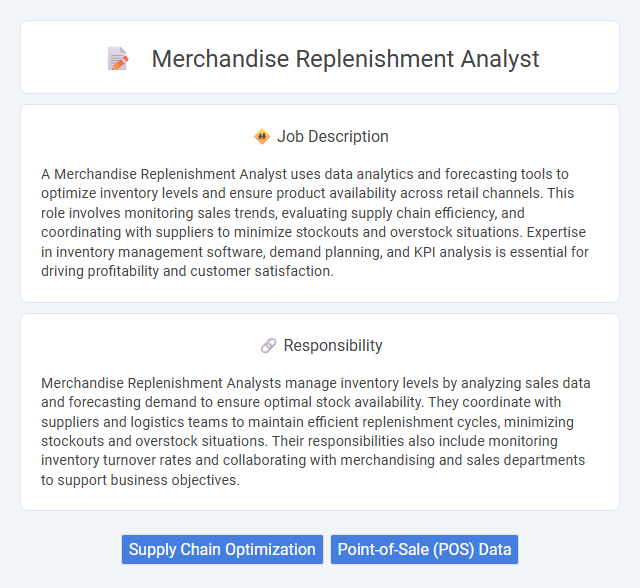
A Merchandise Replenishment Analyst uses data analytics and forecasting tools to optimize inventory levels and ensure product availability across retail channels. This role involves monitoring sales trends, evaluating supply chain efficiency, and coordinating with suppliers to minimize stockouts and overstock situations. Expertise in inventory management software, demand planning, and KPI analysis is essential for driving profitability and customer satisfaction.
Individuals with strong analytical skills and attention to detail will likely be well-suited for a Merchandise Replenishment Analyst role. Those who thrive in fast-paced environments and can manage inventory effectively have a higher probability of success in this position. Candidates who struggle with data interpretation or multitasking may find the demands of this job challenging.
Qualification
Merchandise Replenishment Analysts require strong analytical skills and proficiency in inventory management systems such as SAP or Oracle to optimize stock levels and reduce stockouts. Extensive knowledge of demand forecasting techniques and experience with data analysis tools like Excel or SQL enhance decision-making accuracy. Effective communication and coordination abilities are essential for collaborating with suppliers and cross-functional teams to ensure timely product availability.
Responsibility
Merchandise Replenishment Analysts manage inventory levels by analyzing sales data and forecasting demand to ensure optimal stock availability. They coordinate with suppliers and logistics teams to maintain efficient replenishment cycles, minimizing stockouts and overstock situations. Their responsibilities also include monitoring inventory turnover rates and collaborating with merchandising and sales departments to support business objectives.
Benefit
Merchandise Replenishment Analyst roles likely offer benefits such as improved inventory management and reduced stockouts, which can enhance overall supply chain efficiency. The position may provide opportunities to leverage data analysis skills, increasing career growth potential in retail analytics. Potential access to advanced forecasting tools could result in more accurate demand predictions, benefiting both the company and customers.
Challenge
Merchandise Replenishment Analysts likely face the challenge of accurately predicting inventory needs amidst fluctuating consumer demand and seasonal trends. They probably need to balance stock levels to avoid overstocking, which ties up capital, and understocking, which risks lost sales. Their role demands precise data analysis and forecasting skills to continuously adapt to market changes and supply chain constraints.
Career Advancement
Merchandise Replenishment Analysts play a crucial role in optimizing inventory levels and ensuring timely product availability, directly impacting sales and customer satisfaction. Mastery of data analytics, demand forecasting, and supply chain management opens pathways to senior roles such as Inventory Control Manager or Supply Chain Operations Lead. Gaining expertise in advanced software tools and cross-functional collaboration significantly enhances career growth opportunities within retail and wholesale industries.
Key Terms
Supply Chain Optimization
Merchandise Replenishment Analysts play a critical role in supply chain optimization by leveraging data analytics to forecast demand and manage inventory levels efficiently. They utilize advanced software tools and predictive models to minimize stockouts and overstock situations, improving overall operational costs and customer satisfaction. Their insights enable seamless coordination across procurement, warehousing, and retail teams to ensure timely product availability and reduce supply chain lead times.
Point-of-Sale (POS) Data
Merchandise Replenishment Analysts leverage Point-of-Sale (POS) data to predict inventory needs accurately and optimize product availability across retail locations. They analyze sales trends, customer purchase behaviors, and seasonal demand patterns extracted from POS systems to streamline stock levels and reduce out-of-stock occurrences. By integrating real-time POS insights, they enhance replenishment efficiency, supporting improved supply chain responsiveness and increased sales performance.
 kuljobs.com
kuljobs.com